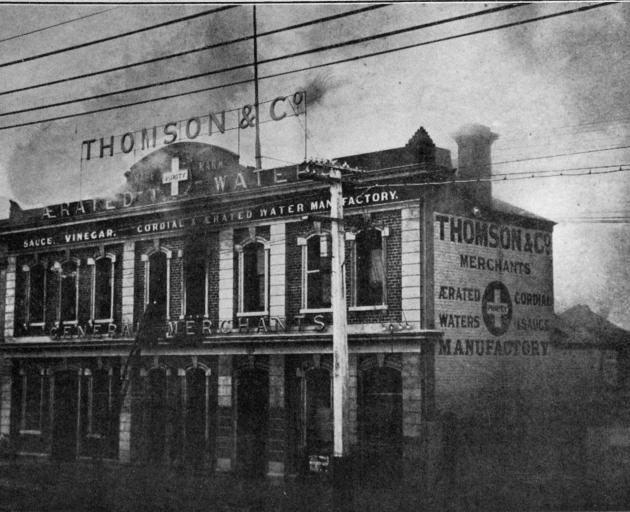
The bulk of the stock was destroyed, and only the walls remain. The insurances amount to 29,000, in the Guardian office. Mr J. B. Thomson, manager of the firm's business at Invercargill, came down from Christchurch by the second express last night.
He states that the cordial-manufacturing plant, a heavy stock of general merchandise, and a large bonded stock of spirits, wines, imported ales, tobacco, and cigarettes have been totally destroyed.
The building itself was gutted. Mr Thomson was, however, unable to say, off hand, what was the value of these stocks. The insurances on the building and stock amount to 29,500, held by the Guardian office, and it is understood that this office retained the greater part of the insurances.
As the firm was just beginning to work up stocks of cordials and aerated waters for the coming Christmas trade, the fire has occurred at a most inopportune time.
Mr George Thomson, of the head office in Dunedin, has, however, entered into negotiations for a new manufacturing plant, and it is the intention of the firm to at once secure temporary premises.
A large supply of whisky worth about 3000, had just been sent to Invercargill for the firm, but this was saved, as it had not been removed from the southern railway station when the outbreak occurred.
The firm's heavy stocks of bottles were stored in Leet street, and were saved.
The horses and waggons are also kept there. Arrangements have been made for the head office in Dunedin to take over the Invercargill branch's supply of cordials, etc., till such time as the temporary plant has been installed.
The information which has been received in Dunedin by the Messrs Thomson is that the water supply was quite insufficient to cope with the fire.
•The Hon. Dr M'Nab (Minister of Justice) has sent us a telegram with reference to a prisoner in Invercargill gaol sentenced to 10 days' bread and water for refusing to work.
The message says: The position in regard to the sentence passed upon Hooper by Mr Cruickshank, S.M., is that the magistrate sentenced the prisoner to 10 days' bread and water for refusing on four successive occasions to go to work.
The maximum penalty under the Prisons Act for this class of offence is 14 days. The practice in the prison at Invercargill and elsewhere when a prisoner is sentenced to solitary confinement is as follows: The prisoner, on returning to the prison after sentence, is locked in the solitary cell, the place of the hammock where the floor is of concrete, as at Invercargill, being supplied by a bed board, without mattress, or by a strip of ruberoid covered by a strip of matting or some other material.
He is not required to sleep on the bare concrete, nor is he deprived of his clothes for the period of the sentence, as suggested in the paragraph.
At 7.30 each evening his outer clothes are taken away from him until the following morning. His blankets are removed during the day, but are returned each evening.
His diet consists of bread and water. After he has been in confinement for two days he must be seen by the medical officer of the prison, who is directed by the regulations to order the prisoner to take such exercise in the open air as he deems necessary, so that it is not a case of continuous solitary confinement.
The medical officer also has full control of the dietary, and, if the prisoner appears to be suffering in health, he always improves the diet.
- ODT, 9.11.1916.
COPIES OF PICTURE AVAILABLE FROM ODT FRONT OFFICE, LOWER STUART ST, OR WWW.OTAGOIMAGES.CO.NZ












